Wrocław#
All pictures were kindly made available by visitwroclaw.eu in partnership with Convention Bureau - WrocławThe history of the city dates back over a thousand years, and its extensive heritage combines almost all religions and cultures of Europe. At various times, it has been part of the Kingdom of Poland, Kingdom of Bohemia, Kingdom of Hungary, Habsburg Monarchy, Kingdom of Prussia, German Empire, Weimar Republic and Nazi Germany. Wrocław became part of Poland again in 1945, as a result of the border changes after the Second World War, which included a nearly complete exchange of population.
Wrocław is a university city with a student population of over 130,000, making it one of the most youthful cities in the country. Since the beginning of the 20th century, the University of Wrocław, previously Breslau University, produced 9 Nobel Prize laureates and is renowned for its high quality of teaching. It is also one of the important hubs of Academia Europaea.
At the end, have a look at some contrasting pictures!
Als Hauptstadt der historischen Region Schlesien ist die kreisfreie Großstadt Sitz eines römisch-katholischen Erzbischofs und eines evangelischen Diözesanbischofs. Mit zahlreichen Unternehmen, Hochschulen, Forschungsinstituten, Theatern und Museen bildet Breslau das wirtschaftliche, kulturelle und wissenschaftliche Zentrum Niederschlesiens.
Im Jahr 1945 wurde Breslau gemäß dem Potsdamer Abkommen unter polnische Verwaltung gestellt. In seiner wechselvollen Geschichte hatte Breslau nach dem Tod des letzten Piastenherzogs Heinrich VI. zu Böhmen (und zeitweise Ungarn) sowie zu Österreich und Preußen gehört. Mit ihren zahlreichen historischen Bauten, Parkanlagen und Plätzen ist die Stadt heute Anziehungspunkt für Besucher aus aller Welt. Breslau war 2012 einer der Austragungsorte der Fußball-Europameisterschaft und 2016 Kulturhauptstadt Europas sowie Verleihungsort des Europäischen Filmpreises.
Nehmen Sie sich am Ende Zeit für einige andere Bilder
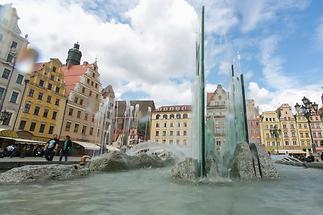 Zdroj Fountain (1)
Zdroj Fountain (1)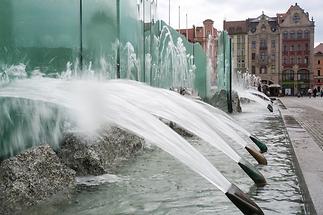 Zdroj Fountain (2)
Zdroj Fountain (2)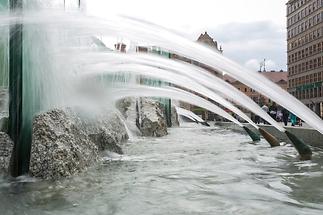 Zdroj Fountain (3)
Zdroj Fountain (3)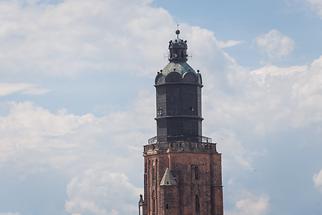 Viewpoint tower of the Garrison Church (1)
Viewpoint tower of the Garrison Church (1)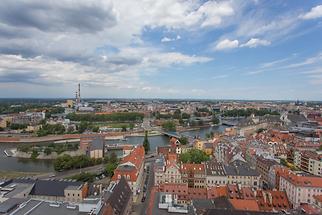 Viewpoint tower of the Garrison Church (2)
Viewpoint tower of the Garrison Church (2)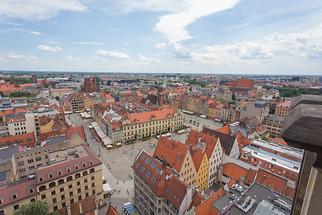 Viewpoint tower of the Garrison Church (3)
Viewpoint tower of the Garrison Church (3)- Viewpoint tower of the Garrison Church (4)
- Viewpoint tower of the Garrison Church (5)
- Viewpoint tower of the Garrison Church, Circular Stairs
- Viewpoint tower of the Garrison Church (6)
- Viewpoint tower of the Garrison Church (7)
- Jatki (The Shambles) (1)
- Jatki (The Shambles) (2)
- Jatki (The Shambles) (3)
- Jatki (The Shambles) (4)
- Sculpture 'Chair'
- Museum of Pharmacy (1)
- Museum of Pharmacy (2)
- Museum of Pharmacy (3)
- Museum of Pharmacy (4)
- Aula Leopoldinum (1)
- Aula Leopoldinum (2)
- Aula Leopoldinum (3)
- Aula Leopoldinum (4)
- Aula Leopoldinum (5)
- Aula Leopoldinum (6)
- The Penitent Bridge (1)
- The Penitent Bridge (2)
- The Penitent Bridge (3)
- The Penitent Bridge (4)
- The Swordsman
- Football Fountain (1)
- Football Fountain (2)
- Mathematical Tower (1)
- Mathematical Tower (2)
- Mathematical Tower (3)
- Mathematical Tower (4)
- Mathematical Tower (5)
- Mathematical Tower (6)
- Cristal Planet (1)
- Cristal Planet (2)
- Antique Trams (1)
- Antique Trams (2)
- Carousel in the Old Town Garden (1)
- Carousel in the Old Town Garden (2)
- Carousel in the Old Town Garden (3)
- Carousel in the Old Town Garden (4)
- Four Denominations District (1)
- Four Denominations District (2)
- Four Denominations District (3)
- Four Denominations District (4)
- Four Denominations District (5)
- Four Denominations District (6)
- Four Denominations District (7)
- Four Denominations District (8)
- Four Denominations District (9)
- Four Denominations District (10)
- Four Denominations District (11)
- Four Denominations District (12)
- Four Denominations District (13)
- Piaskowy Bridge (1)
- Piaskowy Bridge (2)
- Piaskowy Bridge (3)
- Piaskowy Bridge (4)
- The Anonymous Pedestrian (1)
- The Anonymous Pedestrian (2)
- The Anonymous Pedestrian (3)
- The Anonymous Pedestrian (4)
- The Anonymous Pedestrian (5)
- The Burning Sculpture (1)
- The Burning Sculpture (2)
- The Burning Sculpture (3)
- The Burning Sculpture (4)
- Cardinal Bolesław Kominek statue
- Xawery Dunikowski Boulevard (1)
- Xawery Dunikowski Boulevard (2)
- Xawery Dunikowski Boulevard (3)
- Xawery Dunikowski Boulevard (4)
- Xawery Dunikowski Boulevard (5)
- Xawery Dunikowski Boulevard (6)
- Xawery Dunikowski Boulevard (7)
- Xawery Dunikowski Boulevard (8)
- Xawery Dunikowski Boulevard (9)
- Xawery Dunikowski Boulevard (10)
- Xawery Dunikowski Boulevard (11)
- Xawery Dunikowski Boulevard (12)
- Kolejkowo (1)
- Kolejkowo (2)
- Kolejkowo (3)
- Kolejkowo (4)
- Kolejkowo (5)
- Kolejkowo (6)
- Kolejkowo (7)
- Kolejkowo (8)
- Kolejkowo (9)
- Kolejkowo (10)
- Kolejkowo (11)
- Kolejkowo (12)
- Tumski Bridge (1)
- Tumski Bridge (2)
- Tumski Bridge (3)
- Tumski Bridge (4)
- Tumski Bridge (5)
- Tumski Bridge (6)
- Father Zienkiewicz Riverfront (1)
- Father Zienkiewicz Riverfront (2)
- Father Zienkiewicz Riverfront (3)
- Father Zienkiewicz Riverfront (4)
- Father Zienkiewicz Riverfront (5)
- Statue of Pope John XXIII (1)
- Statue of Pope John XXIII (2)
- Katyn Massacre Memorial
- Sculpture 'Waiting' (1)
- Sculpture 'Waiting' (2)
- Viewpoint tower - Cathedral of St. John Baptist (1)
- Viewpoint tower - Cathedral of St. John Baptist (2)
- Viewpoint tower - Cathedral of St. John Baptist (3)
- Viewpoint tower - Cathedral of St. John Baptist (4)
- Viewpoint tower - Cathedral of St. John Baptist (5)
- Viewpoint tower - Cathedral of St. John Baptist (6)
- Viewpoint tower - Cathedral of St. John Baptist (7)
- Viewpoint tower - Cathedral of St. John Baptist (8)
- Maria and Lech Kaczyńscy Boulevard (1)
- Maria and Lech Kaczyńscy Boulevard (2)
- Maria and Lech Kaczyńscy Boulevard (3)
- Maria and Lech Kaczyńscy Boulevard (4)
- Maria and Lech Kaczyńscy Boulevard (5)
- Maria and Lech Kaczyńscy Boulevard (6)
- Maria and Lech Kaczyńscy Boulevard (7)
- Sky Tower Viewpoint (1)
- Sky Tower Viewpoint (2)
- Sky Tower Viewpoint (3)
- Sky Tower Viewpoint (4)
- Sky Tower Viewpoint (5)
- Sky Tower Viewpoint (6)
- Sky Tower Viewpoint (7)
- Sky Tower Viewpoint (8)
- Sky Tower Viewpoint (9)
- Sky Tower Viewpoint (10)
- Sky Tower Viewpoint (11)
- Grunwaldzki Bridge (1)
- Grunwaldzki Bridge (2)
- Grunwaldzki Bridge (3)
- Grunwaldzki Bridge (4)
- A Train to the Sky (1)
- A Train to the Sky (2)
- A Train to the Sky (3)
- MWW Wrocław Contemporary Museum (1)
- MWW Wrocław Contemporary Museum (2)
- MWW Wrocław Contemporary Museum (3)
- Wrocław University of Technology Riverfront (1)
- Wrocław University of Technology Riverfront (2)
- Wrocław University of Technology Riverfront (3)
- Wrocław University of Technology Riverfront (4)
- Wrocław University of Technology Riverfront (5)
- Wrocław University of Technology Riverfront (6)
- Wrocław University of Technology Riverfront (7)
- Wrocław University of Technology Riverfront (8)
- History Centre Zajezdnia (1)
- History Centre Zajezdnia (2)
- History Centre Zajezdnia (3)
- History Centre Zajezdnia (4)
- History Centre Zajezdnia (5)
- History Centre Zajezdnia (6)
- History Centre Zajezdnia (7)
- Cognitive Centre in the Centennial Hall (1)
- Cognitive Centre in the Centennial Hall (2)
- Centennial Hall (1)
- Centennial Hall (2)
- Centennial Hall (3)
- Four Domes Pavilion
- Four Domes Pavilion - Inside (1)
- Four Domes Pavilion - Inside (2)
- Four Domes Pavilion - Inside (3)
- Four Domes Pavilion - Inside (4)
- Four Domes Pavilion - Inside (5)
- Four Domes Pavilion - Inside (6)
- Four Domes Pavilion - Inside (7)
- Wrocław Multimedia Fountain (1)
- Wrocław Multimedia Fountain (2)
- Wrocław Multimedia Fountain (3)
- Wrocław Multimedia Fountain (4)
- Wrocław Multimedia Fountain (5)
- Wrocław Multimedia Fountain (6)
- Wrocław Multimedia Fountain (7)
- Wrocław Multimedia Fountain (8)
- Wrocław Multimedia Fountain (9)
- Wrocław Multimedia Fountain (10)
- Wrocław Multimedia Fountain (11)
- Wrocław Multimedia Fountain (12)
- Japanese Garden (1)
- Japanese Garden (2)
- Japanese Garden (3)
- Japanese Garden (4)
- A Wooden Church in Szczytnicki Park (1)
- A Wooden Church in Szczytnicki Park (2)
- A Wooden Church in Szczytnicki Park (3)
- A Wooden Church in Szczytnicki Park (4)
- WuWA District (1)
- WuWA District (2)
- WuWA District (3)
- WuWA District (4)
- WuWA District (5)
- WuWA District (6)